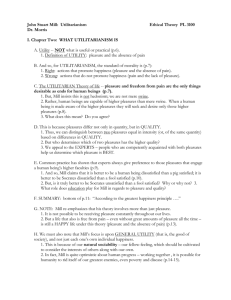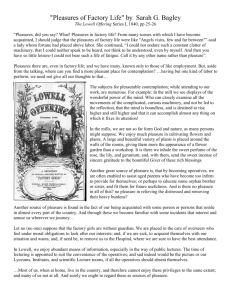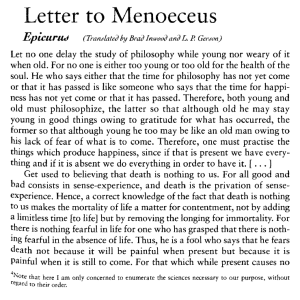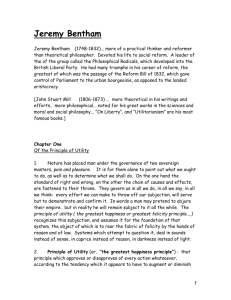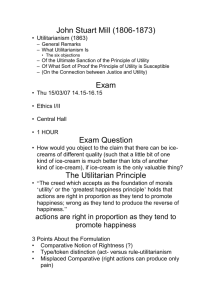Millian superiorities in historical perspective: the early reception of
advertisement
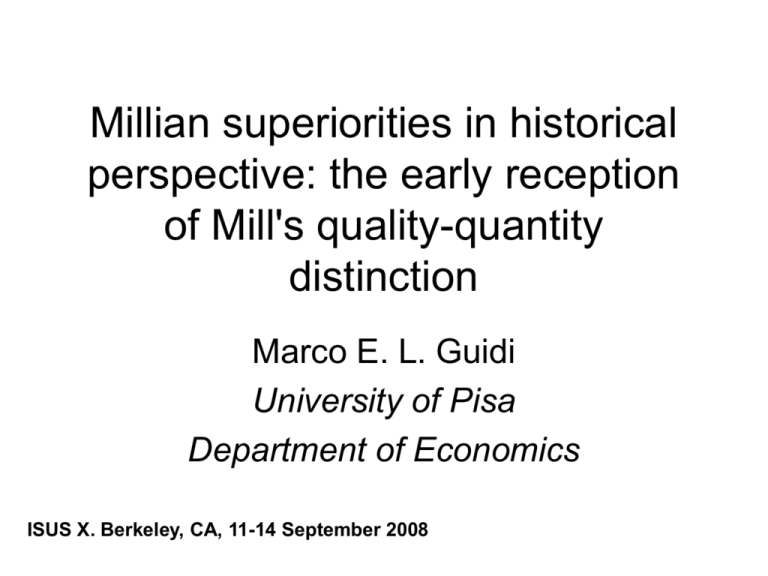
Millian superiorities in historical perspective: the early reception of Mill's quality-quantity distinction Marco E. L. Guidi University of Pisa Department of Economics ISUS X. Berkeley, CA, 11-14 September 2008 Objectives and questions • Current debate on Mill’s quality-quantity distinction: compatible with hedonistic analysis? • Early reception of Mill’s analysis of pleasures among British early marginalist economists (Jevons, Edgeworth, Marshall, Wicksteed): – Bentham’s “felicific calculus” becomes the foundation of economic theory – The individual weighs goods according to the comparative pleasure they generate, in order to maximise utility or happiness. – Individual equilibrium at equal weighed marginal utility • Was there a room for Mill's distinction in such a reformulation of utilitarian arithmetic? • Was the distinction accepted of rejected? • What arguments were deployed? • What can we learn from this early reception? Mill's superiorities • Chapter 2 of Utilitarianism (1861) – Bentham and Mill based superiority on quantitative “circumstances”, such as intensity, duration, and purity, “that is, in their circumstantial advantages rather than in their intrinsic nature” – “It is quite compatible with the principle of utility to recognise the fact, that some kinds of pleasure are more desirable and more valuable than others.” Mill's superiorities • “If I am asked, what I mean by difference of quality in pleasures, or what makes one pleasure more valuable than another, merely as a pleasure, except its being greater in amount, there is but one possible answer. Of two pleasures, if there be one to which all or almost all who have experience of both give a decided preference, irrespective of any feeling of moral obligation to prefer it, that is the more desirable pleasure. If one of the two is, by those who are competently acquainted with both, placed so far above the other that they prefer it, even though knowing it to be attended with a greater amount of discontent, and would not resign it for any quantity of the other pleasure which their nature is capable of, we are justified in ascribing to the preferred enjoyment a superiority in quality, so far outweighing quantity as to render it, in comparison, of small account” Current debate • • • • • • F.H. Bradley 1873 and George E. Moore 1903: we must drop hedonism to make room for qualitative distinctions Roderick T. Long 1992: qualitative distinctions compatible with psychological hedonism, but only indirectly so. It is the pleasantness of adopting a nobler character, not the higher pleasure itself, that provides quantitative superiority. Jonathan Riley 1993 (1999, 2008): Mill’s superiorities incompatible with quantitative hedonism: quantitative differences within each class are finite, whereas quantitative differences between different classes are infinite. Geoffrey Scarre 1997: if a psychological difference scarcely proved; if an axiological difference, we move from hedonism to pluralism back to Moore and Bradley Jesper Ryberg 2002: traditional arguments in favour of discontinuity provide “equally good reasons for claiming that pleasures are measurable on a single additive scale” Rabinowicz 2003 and Arrhenius and Rabinowicz 2005: at least for weak superiority, if in a decreasing sequence e1, ... , en the first element is superior to the last, it is possible that no element be superior to its immediate predecessor. Superiority and weak superiority • an e-object is superior to e' if and only if e is better than whatever number of e' • an e-object is weakly superior to e' if and only if for a number m, m e-objects are better than whatever number of e‘ • Satiation an e-object is superior to e' if the value of one unit of e is non-lower than the finite limit-value Ve of e'. The marginalist revolution and Mill • W. Stanley Jevons – 1879. John Stuart Mill's Philosophy Tested. IV.-Utilitarianism. Contemporary Review, 36, Sept.-Dec., 521-38. • Mill's distinction purely qualitative -- based on “intrinsic” incommensurability. • praises Bentham for introducing, with measurability, scientific criteria into moral and social sciences Jevons • Jevons 1879. – Criticism on Mill's focuses on two distinct arguments: 1. Mill's quality-quantity distinction is inconsistent: the pursuit of happiness is a constrained maximisation process and for the majority of persons it is incompatible with the costly and quite improbable rewards that can be obtained from superior pleasures. People do indulge in inferior pleasures and Mill's explanation of this phenomenon uses unconvincing ad hoc arguments; 2. Mill's theory of intrinsically superior pleasures is a let-down vis-à-vis Paley's and Bentham's quantitative and scientific analysis of pleasures and pains. Their analysis contains all the elements that allow us to explain higher pleasures: • Externalities = dimensions of fruitfulness, purity (+ extension) can account for their higher individual and social value. Jevons • Jevons's economic writings. – “Brief Account of a General Mathematical Theory of Political Economy” (1862); – Theory of Political Economy (1871); – Political Economy (Science Primers) (1878). – “The theory which follows is entirely based on a calculus of pleasure and pain; and the object of Economy is to maximise happiness by purchasing pleasure, as it were, at the lowest cost of pain” [Jevons 1871, 27]. – Chapters 2 and 3 based on Bentham + “final degree of utility” Jevons • Jevons's economic writings. – (anti-imperialist approach) Higher pleasures do exist but they are out of the scope of economics: economics essentially deals with the “lowest ranks of feelings” it is not a “a dismal, cold-blooded” science for this; – The satisfaction of vital needs is a necessary precondition for superior pleasures • primum vivere, deinde filosofari • superior pleasures originate from the satiation of lower wants Senior's “law of variation” Jevons’s “law of succession of wants” (Hobbesian view of needs) Jevons • Jevons's economic writings. – (nevertheless) A definition of superior pleasures: • “As it seems to me, the feelings of which a man is capable are of various grades. He is always subject to mere physical pleasure or pain, necessarily arising from his bodily wants and susceptibilities. He is capable also of mental and moral feelings of several degrees of elevation. A higher motive may rightly overbalance all considerations belonging even to the next lower range of feelings; but so long as the higher motive does not intervene, it is surely both desirable and right that the lower motives should be balanced against each other” (TPE, 29-30). – An unity of a superior pleasure may in some cases overbalance any quantity of the next lower pleasure: discontinuity in the series of wants Jevons • “Brief account”: the analytical basis of this argument lies in the notion of decreasing “final degree of utility” (marginal utility), and in the consequent concept of satiation: – “This function of utility is peculiar to each kind of object, and more or less to each individual. Thus, the appetite for dry bread is much more rapidly satisfied than that for wine, for clothes, for handsome furniture, for works of art, or, finally, for money. And every one has his own peculiar tastes in which he is nearly insatiable” [Jevons 1866, § 9]. • It may happen that when the satisfaction of the lower wants is attained, the value in terms of pleasure thus obtained is still lower than that of a unit of a higher pleasure. • Superiorities are perfectly compatible with hedonistic analysis and felicific calculus. Philip Henry Wicksteed • The Common Sense of Political Economy (1910): popularisation of the principles of marginalist analysis • Towards praxeology… – “It will easily be shown that the principle laid down by Jevons is not exclusively applicable to industrial or commercial affairs, but runs as a universal and vital force through the administration of all our resources. It follows that the general principles which regulate our conduct in business are identical with those which regulate our deliberations, our selections between alternatives, and our decisions, in all other branches of life” [Wicksteed 1910, 3]. • Mill's abstraction of the homo oeconomicus motivated by self interest is rejected. Wicksteed • model housekeeper: – Given budget, given price, variable goals – goal = providing food for her family compares prices of poultry and potatoes, of new and old potatoes, damsons and greengages, etc. – goal = “doing honour to a small party of neighbours” poultry is more appreciated than cod, nevertheless comparative prices may decide in favour of cod. – Superior goal = violin lessons for kids relative prices matter also in this case There is (almost) always a maximum cost that may induce an individual to renounce to superior pleasures. – (‘More’) superior goal = “relieving the Indian famine” always balanced out with lower wants! Wicksteed • “We have thus arrived at the conclusion that all the heterogeneous impulses and objects of desire or aversion which appeal to any individual, whether material or spiritual, personal or communal, present or future, actual or ideal, may all be regarded as comparable with each other; for we are, as a matter of fact, constantly comparing them, weighing them against each other, and deciding which is the heaviest. And the question, 'How much of this must I forgo to obtain so much of that ?' is always relevant.” Wicksteed • Behind the way in which our housewife balances goals against each other there is decreasing marginal utility individual equilibrium at equal marginal utilities weighed by prices • Does not imply that total utility is equal: the shape and slope of marginal utility curves varies. • Superior vs inferior pleasures: different trends, but always balanced against each other U’ Playing violin Water Bread Q P Dvl Dvl’ Dw Db Q Wicksteed • “In a story of South America, after the war, we are told of a planter who, when warned by his wife in the middle of his prayers that the enemy was at the gate, concluded his devotions with a few brief and earnest petitions, and then set about defending himself. Had he been a formalist those final petitions would never have been uttered at all; but under the circumstances the impulse to prayer, though sincere and urgent, became rapidly less imperative and exacting relatively to the urgency of taking steps for defence, as the successive moments passed” [Wicksteed 1910, 79-80]. Wicksteed • Extreme cases: the martyr and the hero – The martyr pays with life his determination not to depart “from the formula of his confession”. Does this example falsify the assertion that every choice is relative? – NO: “This only means that to him the total difference between the command of things in the circle of exchange that he already enjoys, and an indefinite or unlimited command of them, does not weigh as heavy in his mind as the dishonour or the discomfort of the specific thing that he is required to do. It does not mean that his objection is "infinite." It merely means that it is larger than his estimate of all the satisfaction that he could derive from unlimited command of articles in the circle of exchange, and this is a strictly, perhaps narrowly, limited quantity” U’ Being loyal Continuing to live Q Wicksteed • Wicksteed suspects that the current meaning of superior pleasures reflects instinctive moral judgment (discarded by Mill) • Example: learning to smoke costs some pain as learning to play violin, but it is not so admired. Conclusions • Lessons: 1. Marginalist economists discarded qualitative definitions of superior pleasures as self-contradictory and incompatible with hedonistic analysis. 2. They argued that Benthamite quantitative analysis was sufficient to capture all the characteristics of superior pleasures. In particular they emphasised the function of • externalities, in the shape of Bentham's and Jevons's “dimensions” of fecundity, purity, +extension; • decreasing marginal utility and satiation, that may explain discontinuities without having to resort to infinite differences. Conclusions 3. Marginalist economists explained that due to the phenomenon of satiation, the satisfaction of some inferior pleasures is the condition that allows the emergence of superior goals. 4. They demonstrated that superior and inferior goods are submitted to the same psychological laws, i.e.: – – – decreasing marginal utility; satiation; they are balanced against each other and against inferior goods in every practical choice. 5. However they may follow different patterns as regards marginal and total utility. Conclusions 6. Axiomatic or argumentative demonstration of superiorities has low practical significance when we observe the choices of individuals, including intellectuals, fundamentalists and, to some extent, heroes and martyrs. And even when we consider their choice from the more normative point of view of rationality or utility maximisation. Individuals do balance inferior and superior pleasures against each other and choose that combination that maximises utility under the constraints of available resources and given costs. 7. Genuine albeit unconscious moral judgments sometimes surreptitiously intervene into the definition of superior pleasures. Conclusions Without sharply deciding in favour of one or the other side in present controversies, the early reception of Mill's distinction helps avoiding unnecessary errors.

